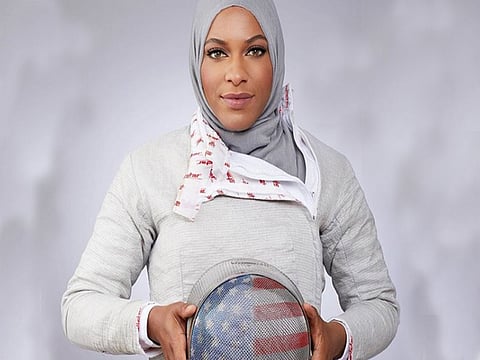Ibtihaj Mohammad in Dubai: "The Olympics were the hardest thing of my life"
"If you tell me you want to go to the Olympics I will try to talk you out of it!”

One day, Ibtihaj Mohammad and her mother happened to be driving past a high school in her town of Maplewood, New Jersey, located 30 minutes south-west of New York City. At that moment, they saw fencers outside of the school cafeteria competing with one another. They had white pants and a white jacket on and a fencing mask. Her mother said to her at that moment… “I don’t know what this sport is, but you are going to do it.”
That is how Ibtihaj discovered fencing.
Ibtihaj Mohammad is an American sabre fencer, and a member of the United States fencing team. She is a 2016 Olympic bronze medallist, 5-time Senior World medallist and World Champion and is also known for being the first Muslim American woman to wear a hijab while competing for the United States in the Olympics. To Ibtihaj, it wasn’t about being the black kid in the room, or being the girl who wears a hijab. As a fencer, no one knew who was under the mask, so there is this element of secrecy and an opportunity to show what she is made of without any assumptions about her skill.
“I remember being a young kid, I put the hijab on when I was 12 years old. I was really trying to find myself in an athletic space. When I put my fencing mask on for the first time, I felt like a super hero!”
Ibtihaj does not care what other people think. She completely rejects the idea that you need people around you to love you. All that matters is you. “I don’t need anyone’s acceptance. I don’t need anyone to tell me that I’m great. I don’t rely on other people in order to believe in myself. I accepted and learn to love myself all on my own.”
Her religion has made headlines during the Rio Olympics and she patiently faced the media in recent months, answering every question, determined to serve as an example at a time when Islam is so controversial in US politics and the news.
“Growing up in the states, as a religious minority is hard. We were the only Muslim family in our town, but I don’t feel like any part of this journey of mine has been a burden,” she said. “I feel like it has been a blessing to represent so many people who don’t have voices” she said.
“This small piece of fabric is so meaningful to Muslim women. But in America, as an ethnic and as a religious minority, there are a lot of factors that exist and are put in place to hinder us from achieving our goals. Going to the Olympics was literally the hardest thing I have ever done in my life. If you tell me you want to go to the Olympics I will try to talk you out of it!”
Ibtihaj described that qualifying for the USA Olympic team is like going to work with a group people who don’t like you and who don’t want you there. They threw obstacles in her path, as well as throwing cheap shots about her faith and where she was from. “They tried to break my psyche, and that was my experience for the 8 years. I still think back and wonder how I did it and how I arrived at this point.”
The topic of depression also came up. It is difficult to imagine anyone going through what she did without there being mental ramifications. “In the United States it’s very taboo to talk about depression. Everyone just tells you to pray and you’ll feel better, but I don’t think it’s as simple as that. I had to break down the sadness I was feeling. The trick was to tackle it head on, instead of shoving it down. Asking for help is what allowed me to be here today.”
Ibtihaj also reveals the true nature of many coaches she came across during her career to qualify for the Olympics. “I met and worked with many coaches who were misogynist, who didn’t believe in women, who don’t think that we have a place in sports. I have come across national coaches who have tried to pigeon hole me as a black athlete, which means they focused on my strength, and assumed that I had no tactical thinking. Their racism and bigotry preceded them.”
People will always try to break you. Don’t let it infest, speak to someone. Put self-care first.
“I learn to focus on the people who help me and I just block out the haters.”
Sign up for the Daily Briefing
Get the latest news and updates straight to your inbox
